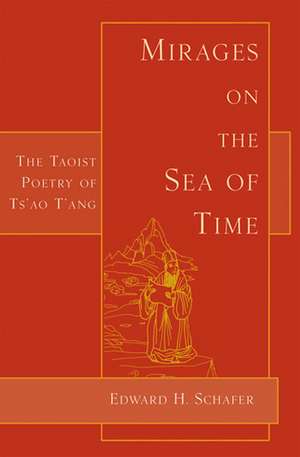Mirages on the Sea of Time: The Taoist Poetry of Ts'ao T'Ang
Autor Edward H. Schaferen Limba Engleză Paperback – 30 iun 2010
Preț: 267.87 lei
Nou
Puncte Express: 402
Preț estimativ în valută:
51.25€ • 53.52$ • 42.33£
51.25€ • 53.52$ • 42.33£
Carte indisponibilă temporar
Doresc să fiu notificat când acest titlu va fi disponibil:
Se trimite...
Preluare comenzi: 021 569.72.76
Specificații
ISBN-13: 9781891640452
ISBN-10: 1891640453
Pagini: 164
Dimensiuni: 152 x 226 x 13 mm
Greutate: 0.28 kg
Editura: Floating World Editions
ISBN-10: 1891640453
Pagini: 164
Dimensiuni: 152 x 226 x 13 mm
Greutate: 0.28 kg
Editura: Floating World Editions
Descriere
Since the early seventeenth century, Taoism-the native religion of China-has been generally regarded by authorities there as base superstition and potentially subversive. The Taoist poetry of medieval China was consequently ignored by Chinese arbiters of taste and, until recently, most Western scholars and translators have accepted this judgment uncritically; a body of beautiful verse, with analogues in the poetry of Christian mysticism, has remained virtually unknown in our time. This book augments the efforts of a few contemporary Western scholars to recover the meaning and value of this literary heritage. The eminent sinologist Edward H. Shafer translated all the surviving verse of the ninth-century poet Ts'ao T'ang, and to the selections published here has added introductory remarks on the source of the poet's imagery and short essays on his treatment of figures of the Taoist pantheon. Ts'ao Tang has placed these deities and demiurges in a number of unstable or ambiguous settings such as celestial gardens, sparkling palaces on the summits of sacred mountains, and secret places of rendezvous on magic islands in the eastern sea. The poet creates a world of illusions, in which it is difficult to distinguish vestments from rainbows, castles from crags, birds from spirits, sea-waves from sea-mounts-even lords from ladies. These contrived wonders are all metaphors for a world completely inaccessible to our mortal senses.
